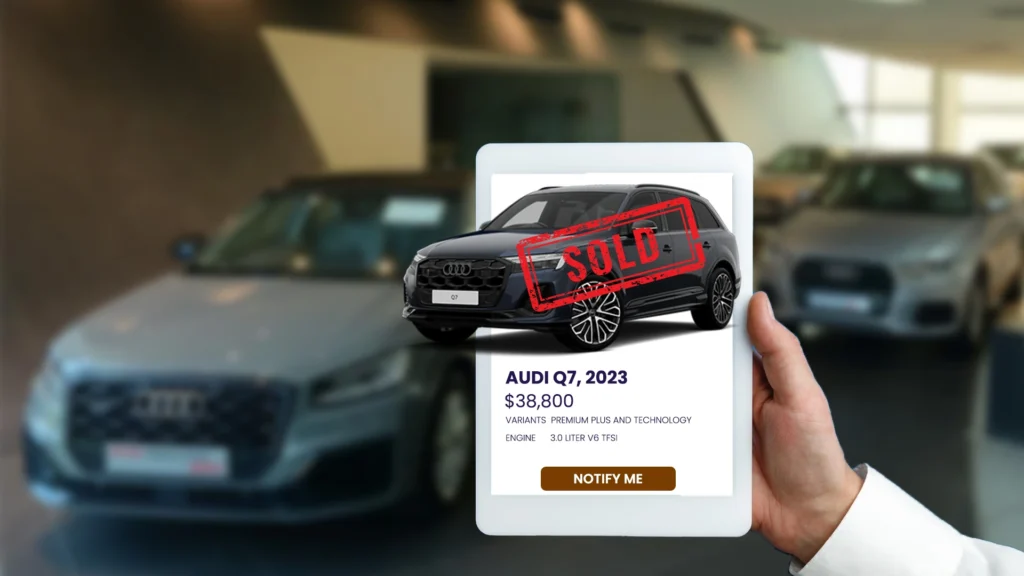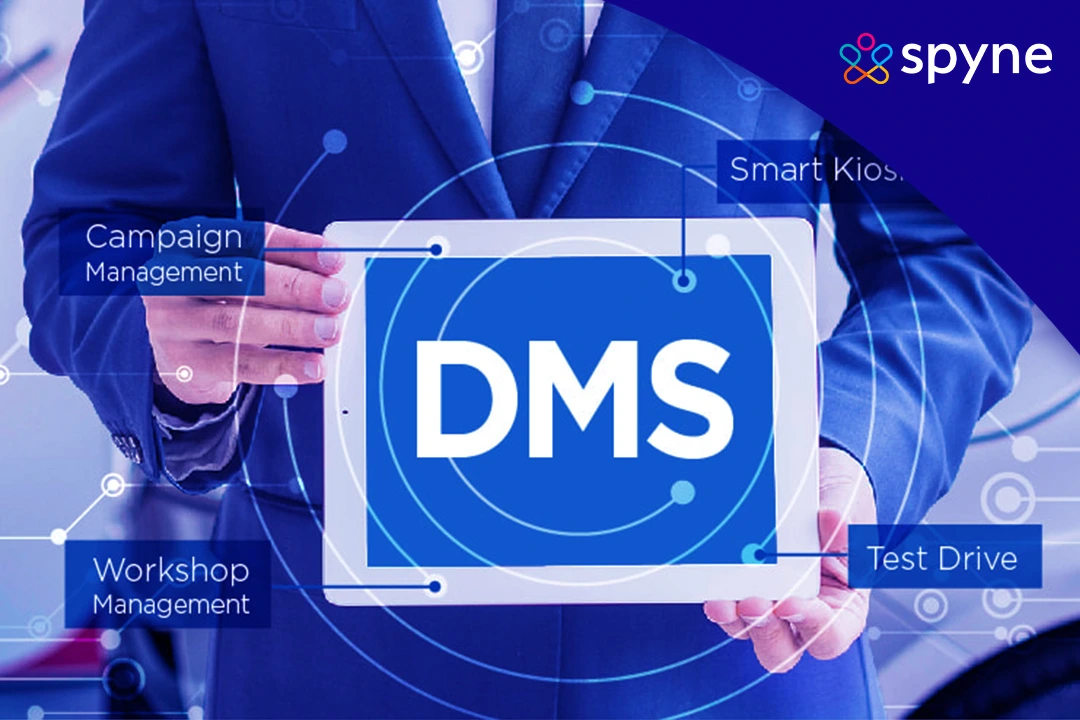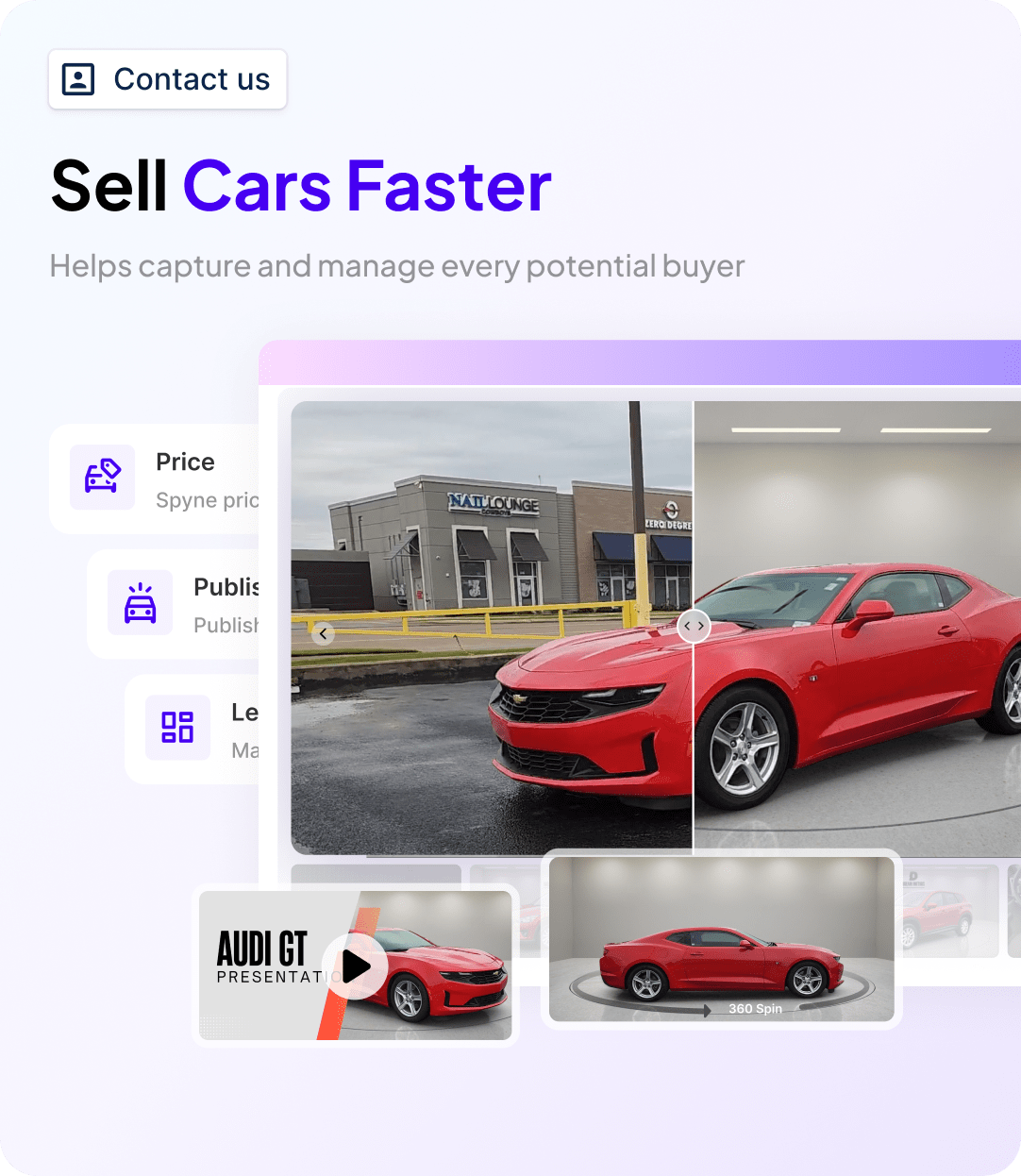With continuous advancements in technology and innovative tools, the days when dealerships relied solely on traditional sales methods have evolved significantly. Dealerships no longer depend on manual processes and disconnected systems; they now leverage comprehensive Dealer Management Systems (DMS) that streamline every aspect of their operations. This blog explores DMS systems for car dealerships’ essential role in modern automotive dealerships and how these systems transform dealership management, customer engagement, and overall efficiency.
What is a Dealership Management System (DMS)?
A DMS systems for car dealerships is a comprehensive solution designed for automotive dealership operations and covers all aspects of the business. It manages day-to-day activities, streamlines workflow, and helps retain current customers and win new ones. The software includes the sales process, marketing, lead management, Automotive CRM, financing, invoicing, automotive inventory management, and other backend operations. Its coverage is evident in how it helps bring in and follow up on leads, leading to more business and profits, thereby ensuring long-term sustainability.
What Does a Dealer Management System Do?
A DMS systems for car dealerships is responsible for streamlined operations for a dealership. Let’s see what it does:
1) Centralized Operations: A DMS consolidates all daily functions—sales, financing, service history, inventory, and lead follow-ups—into a single platform for a dealership, eliminating the need for multiple platforms, which helps reduce the risk for human errors
2) Enhanced Efficiency: A DMS provider looks to unify operations into one cloud-based application, enabling seamless data exchange between departments. This allows dealerships to manage workflows more effectively and monitor the entire business in real-time.
3) Improved Customer Experience: With streamlined customer and vehicle data access, dealerships can respond faster to potential customers and provide more personalized service with the leads they receive, making follow-ups easy.
4) Cost Savings: A DMS can reduce operational costs by improving process efficiencies, minimizing redundancy, and eliminating administrative tasks that slow down workflows.
5) Informed Decision-Making: The DMS provides a top view of the dealership’s operations, enabling better oversight and informed decision-making for business growth.
6) Scalability for Growth: Traditional methods limit dealerships regarding expansion, whereas DMS is adaptable, allowing dealerships to scale operations smoothly and handle increased business demands.
How to Choose the Right DMS for Your Car Dealership?
Choosing suitable DMS systems for car dealerships involves some considerations. Let’s see how-
1) Comprehensive Capabilities
Choose a DMS system for a car dealership that provides an all-in-one solution, allowing access to vital information across locations, departments, and divisions. Look for customizable reporting options that support all business processes, from inventory to accounting.
2) Robust Accounting & Financial Insights
Your DMS should enable real-time financial analysis, including profitability reports, budget tracking, expense management, and vendor history visibility.
3) Enhanced Sales & CRM Tools
Opt for a DMS that integrates high-resolution product visuals, detailed information, and automated lead tracking. It should assist in quote preparation, follow-ups, and unit cost tracking while offering a consolidated view of customer interactions for more effective marketing.
4) Optimized Purchase & Inventory Management
Efficiently manage purchasing and Car Inventory Management with automated suggestions, transaction management, and real-time inventory tracking. Integration with local suppliers, manufacturers, and unique order management is essential for accurate inventory valuation and point-of-sale efficiency.

5) Service & Profitability Enhancements
Select a DMS that streamlines service operations, manages warranty claims, and offers tools for tracking technician performance to boost profitability.
6) Reliable IT & Security Support
Ensure the DMS provider provides data security with encryption, offsite backups, and dependable IT support for emergency needs.
7) Customer Support & Training Resources
Seek a vendor with accessible support during operational hours, alongside extensive training resources like tutorials and documentation, to aid quick issue resolution and maximize system utilization.
8) Vendor Trustworthiness & Scalability
Choose a reputable DMS provider with customization capabilities for future dealership growth. The system should adapt to your expanding inventory and integrate seamlessly with new technologies as they emerge.
9) Compliance & Security Standards
Verify that the DMS complies with industry regulations and implements security features, such as encryption and access controls, to safeguard data integrity.
10) Budget Friendly
Most of the time, the most costly option seems the most effective. Knowing how pricing works in your dealer management software is essential. Before deciding on a tool, consider the possibility of an ROI on a dealer management system (DMS) that could be achieved through improved efficiency, reduced error rates, and more sales.
Best 10 DMS Benefits to Car Dealerships
Since DMS systems for car dealerships are made for all the tasks and workings of dealerships, they do so in a way that involves a lot of benefits. Let’s see how-
1) Personalized Service
It provides prompt, friendly service tailored to each customer’s needs, creating a customized experience. Customers can also explore models online, making better choices without entering the dealership.
2) Leads Management
The strategy implemented by DMS allows dealerships to have easy follow-ups, leading to more chances of converted sales. Lead handling is much more efficient and reduces the sales staff’s load. It also has efficient Automotive Lead Generation for Car Dealerships.
3) Simplified Workflow
This system automates work scheduling, customer appointments, and test drive requests, providing confirmations to all parties. It also facilitates smooth vehicle delivery management, enhancing customer satisfaction and reducing delays.
4) Operation Streamlining
Centralizing dealership operations reduces time and costs while allowing a focus on growth and customer service. It also automates inventory and report generation, saving time and reducing manual errors in operations.
5) Customer Engagement and Service
It enhances customer relationship management by tracking preferences, service history, and interactions. DMS also boosts engagement by enabling online interactions and building rapport months before a sale.
6) Data Insights
DMS stores data in one place, so a centralized database is used. This makes data more accessible to handle and assess and gives you a better analysis of trends. With the real-time forecast, dealerships know how well they are working and what changes they need to implement in the current system to improve.

7) User-friendly organization
A dealership management system is designed for everyday use. It makes it easy for your team to manage transactions, whether sales reps check the inventory or send over contracts and collect buyer payments. As most DMSs are cloud-based, they have the additional user-friendly aspect of accessibility and even allow easy remote access.
8) Cost Reduction
Rather than paying for different tools, you can find all their features under a single platform roof, be it CRM, inventory management, or more. Integrating all your tools into one platform isn’t just convenient; it’s very cost-effective.
9) Inventory Management
Inventory Management is made easy with a DMS. It is needed since keeping track of inventory is vital for keeping up with customer demand. Running out of in-demand models or parts delays service delivery, tainting the customer experience and potentially leading to lost sales. A system that can manage inventory flow enables you to keep customers happy without compromising your cash flow and storage.
10) Scalability
A DMS is software that can be easily scaled according to the size of your team, your customer base’s growth rate, and your company’s expansion. It has enough flexibility to meet the needs of independent dealers, large-scale franchises, and everything in between. If you have big ambitions for your dealership, it’s an excellent system to have in place because it gives you the tools you need to grow and efficiently manage the extra workload.
Top 14 DMS for Automotive Dealerships
Let’s have a look at the top DMS systems for car dealership providers that offer every feature in the automotive space:
1) Spyne
Spyne’s upcoming automotive DMS will feature AI-powered image enhancement, smart inventory and pricing management, real-time analytics, seamless CRM integration, mobile accessibility, and automated vehicle descriptions. It will offer dealerships a comprehensive, data-driven solution for optimized operations and enhanced customer engagement.
| Pros | Cons |
| AI-powered image enhancement, smart inventory, and pricing management. | It is new in the market, with features still maturing. |
| Real-time analytics, CRM integration, mobile accessibility, and automated vehicle descriptions. | Industry adoption is yet to be proven. |
2) vAuto Provision
It focuses on leveraging pure data. This specialized DMS excels in inventory management, dynamic pricing, and predictive analytics. For those driven by data-driven decision-making, vAuto Provision serves as a catalyst, empowering dealerships to unleash the full potential of their inventory and pricing strategies.
| Pros | Cons |
| Strong focus on data-driven inventory management, dynamic pricing, and predictive analytics. | Limited CRM and marketing features. |
| Ideal for dealerships focused on maximizing inventory and pricing efficiency. | Primarily supports inventory, not comprehensive. |
3) vAuto Conquest
While its sibling, vAuto Provision, focuses on inventory, vAuto Conquest is the lead generation king. This DMS is all about lead capture and management and how to automate marketing along with CRM integration.
| Pros | Cons |
| Excellent for lead generation, automated marketing, and CRM integration. | Limited inventory tools; best as a complement. |
| Helps streamline marketing and customer engagement efforts. | Not suited as a standalone DMS. |
4) Dealer.com
A set player in the industry, Dealer.com’s expertise revolves around targeted Car Digital Marketing campaigns, lead nurturing, conversion, and website and social media management. With a specialized focus on marketing strategies, Dealer.com emerges as a compelling option for dealerships aiming to strengthen their online presence and enhance customer engagement.
| Pros | Cons |
| Targeted digital marketing, lead nurturing, and website/social media management. | Limited inventory and operational features. |
| Great for dealerships focused on online presence and engagement. | Primarily a Marketing solution |
5) DealerSocket
DealerSocket provides a diverse range of CRM and dealership administration tools, guaranteeing that your dealership can navigate even the most complex sales terrain. It’s an excellent solution for dealerships that require a CRM that can adapt to their specific environment.
| Pros | Cons |
| Adaptable CRM with extensive dealership administration tools. | Complex features may require training. |
| Customizable for various sales environments and dealership needs. | Pricey for Small Dealerships |
6) Elead
Elead’s emphasis on customer engagement and retention makes it a good choice for dealerships looking to build a fanbase of customers who can’t get enough of their siren call.
| Pros | Cons |
| Focused on customer engagement and retention for stronger customer relationships. | Limited inventory and pricing features. |
| Excellent choice for building long-term customer loyalty. | Primarily focused on CRM, not full DMS. |
7) DealerTrack
Dealertrack’s cloud-based DMS offers solutions to manage sales, F&I (Finance and insurance), service, and customer retention. It’s known for its ease of use, extensive reporting capabilities, and efficient service workflows, ideal for growing dealerships.
| Pros | Cons |
| Easy to use, with cloud-based sales, F&I, service, and customer retention tools. | Limited scalability for more extensive, complex setups. |
| Intuitive design for new users, making adoption easier. | It may lack some advanced custom features. |
8) VinSolutions
Part of Cox Automotive, VinSolutions combines CRM with inventory management, helping dealerships improve lead tracking and customer interactions. While it’s not a full DMS, it’s a robust CRM solution often used alongside other DMS platforms.
| Pros | Cons |
| Combines CRM with inventory management for efficient lead tracking and customer engagement. | It’s not a full DMS; it works best as a CRM add-on. |
| Advanced marketing automation tools for customer engagement. | It may need integration with other DMS systems. |
9) CDK Drive
One of the significant DMSs used in the industry, CDK Drive, is suited for CRM, sales, F&I, and other tools. Therefore, it provides a wide range of tools and an all-in-one solution for them, and it does all this while being a robust and powerful system. However, due to its high price and complexity, it is only suited for large dealerships.
| Pros | Cons |
| Comprehensive DMS with CRM, sales, F&I, and accounting tools; powerful for large dealerships | High cost and complexity for smaller dealerships. |
| Robust, with all-in-one functionality. | Requires considerable setup and training. |
10) Reynolds and Reynolds
Reynolds & Reynolds provides a wide-ranging DMS with robust features for accounting, inventory management, CRM, and sales tools. It’s highly customizable and caters to compliance and secure data handling, making it a trusted choice for established dealerships.
| Pros | Cons |
| Extensive tools for accounting, CRM, and sales, with customizable options. | It is a complex system that is potentially costly for smaller dealerships. |
| Trusted and reliable for security and compliance. | The steeper learning curve for new users. |
11) Autosoft DMS
Autosoft is a significant competitor in the DMS Marget, known for its impenetrable security and layered access controls. These are your unwavering defenses against malicious attacks, ensuring your data remains confidential, accurate, and accessible. Autosoft also owns Dealermarket, where you can find all kinds of auto dealer supplies for sales, services, and advertising.
| Pros | Cons |
| Strong security with layered access controls; offers “Dealermarket” for auto supplies. | Feature sets may be limited for complex needs. |
| Cloud-based, user-friendly for small to mid-sized dealerships. | There is less flexibility in custom feature additions. |
12) Dabadu XRM
An emerging DMS platform with a relatively minor market share is known for its competitive pricing and agile methodology. Its focus on customer-centric tools, like an intuitive CRM and cutting-edge digital retailing capabilities, underscores its commitment to meet evolving market demands.
| Pros | Cons |
| Competitive pricing, agile with customer-centric CRM and digital retailing capabilities. | Limited market presence and fewer dealership-specific features. |
| Intuitive interface for quick learning and adoption. | Smaller vendor, so support may vary. |
Conclusion
Choosing suitable DMS systems for car dealerships is crucial for streamlined operations, customer satisfaction, and long-term growth. From Spyne’s AI-driven features to CDK Drive’s all-in-one capabilities and DealerSocket’s flexible CRM, today’s DMS options cater to diverse needs. Investing in a suitable DMS can enhance productivity, support scalability, and provide valuable insights that drive efficiency. Ultimately, the suitable DMS empowers dealerships to reduce costs, strengthen customer loyalty, and remain competitive in an evolving automotive market.
















